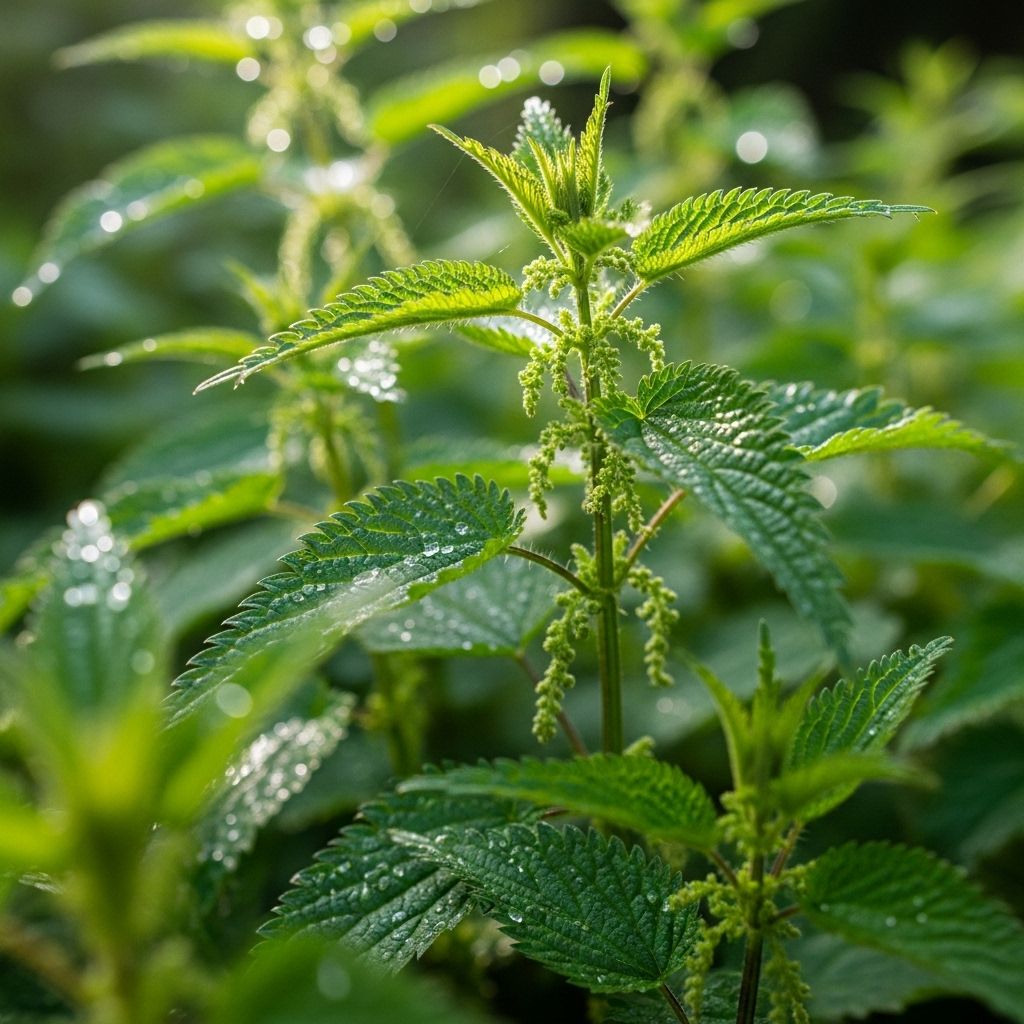Stinging Nettle: Unlocking Its Health Benefits
Discover the numerous health benefits of stinging nettle for a healthier lifestyle.

Table of Contents
- Introduction
- Pharmacological Properties of Stinging Nettle
- Health Benefits of Stinging Nettle
- Anti-Inflammatory Effects
- Metabolic Syndrome Management
- Other Health Benefits
- Frequently Asked Questions (FAQs)
Introduction
Stinging nettle, scientifically known as Urtica dioica, is a plant that has been used for centuries in traditional medicine due to its wide range of health benefits. Despite its reputation as a weed, stinging nettle is packed with nutrients and bioactive compounds such as flavonoids, formic acid, and quercetin, which contribute to its numerous health-promoting properties. This article will explore the pharmacological properties and health benefits of stinging nettle, including its anti-inflammatory effects, role in managing metabolic syndrome, and other significant health advantages.
Pharmacological Properties of Stinging Nettle
Stinging nettle has been extensively studied for its pharmacological properties, which include:
- Antiviral, Antimicrobial, and Antifungal Effects: It has been shown to exert activities against various pathogens, making it a natural remedy for infections.
- Anticancer Properties: While not fully established, some studies suggest potential anticancer effects due to its antioxidant and anti-inflammatory actions.
- Antioxidant and Anti-Inflammatory Effects: These are crucial for protecting cells from damage and reducing inflammation in the body.
- Antiaging Benefits: High content of compounds like quercetin and ursolic acid may contribute to its antiaging properties through enzyme inhibition.
Health Benefits of Stinging Nettle
Beyond its pharmacological properties, stinging nettle offers several direct health benefits, including:
- Antiallergic Effects: It inhibits mast cell tryptase and prostaglandin formation, which can help in managing allergies.
- Anti-Inflammatory: Useful for treating inflammatory conditions such as arthritis and gout.
- Cardiovascular Health: Helps in lowering blood pressure and improving lipid profiles.
- Anti-Diabetic: Stimulates insulin secretion and reduces glucose absorption in the intestine.
Anti-Inflammatory Effects
Stinging nettle’s anti-inflammatory action is attributed to its ability to suppress various inflammatory pathways. It inhibits the normal functioning of enzymes like cyclooxygenases (COX-1 and COX-2), which are involved in the production of prostaglandins and thromboxanes—key mediators of inflammation. Additionally, it reduces the levels of inflammatory cytokines such as TNF-α, IL-1, and IL-2, making it beneficial for conditions like arthritis and chronic myalgia.
Metabolic Syndrome Management
Metabolic syndrome consists of risk factors such as hypertension, dyslipidemia, and high glucose levels, which increase the risk of cardiovascular disease and diabetes. Stinging nettle can help manage these conditions by:
- Lowering Blood Pressure: It aids in reducing both systolic and diastolic blood pressure through its effects on potassium and calcium channels.
- Improving Lipid Profiles: Nettle extracts have been shown to decrease triglycerides and increase HDL cholesterol levels, partly by inhibiting HMG-CoA reductase.
- Anti-Diabetic Effects: It enhances insulin secretion and proliferation of pancreatic β-cells, contributing to better glucose control.
Other Health Benefits
Besides its major health benefits, stinging nettle also offers additional advantages:
- Coagulant Properties: It can help prevent excessive bleeding.
- Lactation Support: Known to increase milk production in breastfeeding mothers.
- Obesity Management: May help in controlling body fat percentage and obesity when combined with aerobic exercise.
Frequently Asked Questions (FAQs)
Q: What are the common uses of stinging nettle?
A: Stinging nettle is used for its anti-inflammatory, antihistamine, and metabolic support properties, among others.
Q: Is stinging nettle safe to consume?
A: Generally, yes, but it should be prepared properly to avoid skin irritation and allergic reactions. Consult a healthcare provider before using it medicinally.
Q: Can stinging nettle be used for osteoarthritis treatment?
A: Yes, studies indicate that nettle extract can be beneficial in reducing osteoarthritis symptoms when combined with conventional treatments.
Q: How does stinging nettle help with allergies?
A: It has antiallergic effects due to its ability to inhibit mast cell tryptase and prostaglandin formation, which are involved in allergic reactions.
Conclusion
Stinging nettle, despite its reputation as a weed, offers numerous health benefits that make it a valuable addition to a healthy lifestyle. Its anti-inflammatory, metabolic, and antioxidant properties highlight its potential as a natural remedy for various health conditions. However, it’s important to use stinging nettle safely and under proper guidance, especially when considering it for medicinal purposes.
References
- https://www.pharmacist.com/Blogs/CEO-Blog/nettle-worthless-weed-or-helpful-herb
- https://pmc.ncbi.nlm.nih.gov/articles/PMC9282742/
- https://pmc.ncbi.nlm.nih.gov/articles/PMC9253158/
- https://www.webmd.com/diet/health-benefits-nettle-leaf
- https://health.clevelandclinic.org/nettle-tea-benefits
- https://institutionalrepository.aah.org/cgi/viewcontent.cgi?article=1216&context=jpcrr
- https://www.urmc.rochester.edu/encyclopedia/content?contenttypeid=19&contentid=Nettle
Read full bio of medha deb












